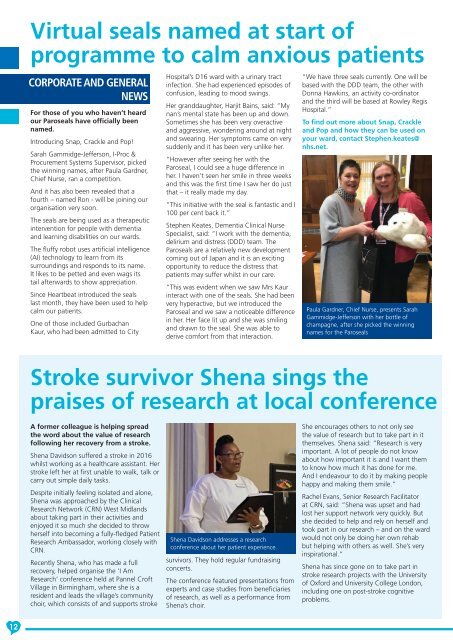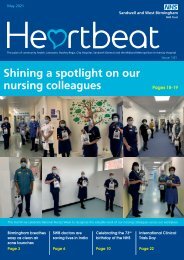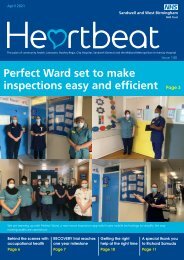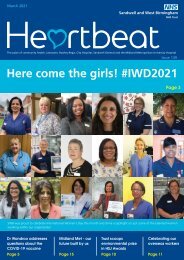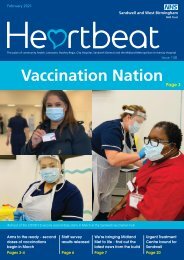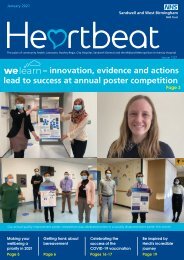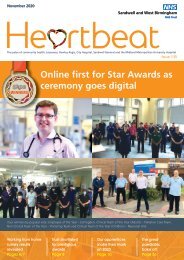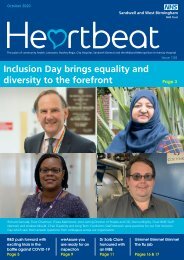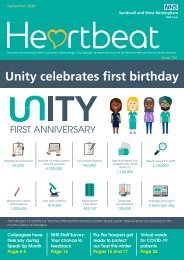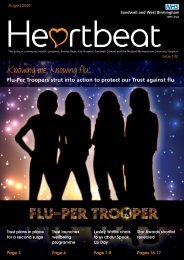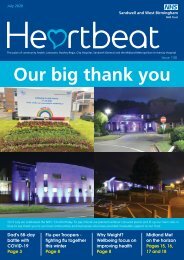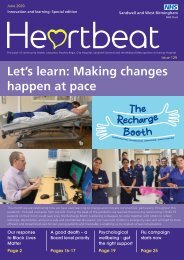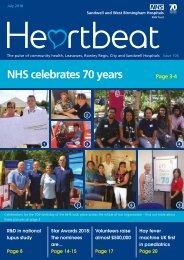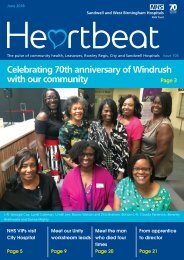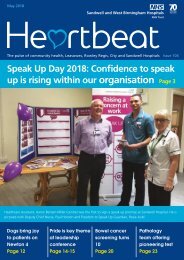HEARTBEAT February 2019
- No tags were found...
You also want an ePaper? Increase the reach of your titles
YUMPU automatically turns print PDFs into web optimized ePapers that Google loves.
Virtual seals named at start of<br />
programme to calm anxious patients<br />
CORPORATE AND GENERAL<br />
NEWS<br />
For those of you who haven’t heard<br />
our Paroseals have officially been<br />
named.<br />
Introducing Snap, Crackle and Pop!<br />
Sarah Gammidge-Jefferson, I-Proc &<br />
Procurement Systems Supervisor, picked<br />
the winning names, after Paula Gardner,<br />
Chief Nurse, ran a competition.<br />
And it has also been revealed that a<br />
fourth – named Ron - will be joining our<br />
organisation very soon.<br />
The seals are being used as a therapeutic<br />
intervention for people with dementia<br />
and learning disabilities on our wards.<br />
The fluffy robot uses artificial intelligence<br />
(AI) technology to learn from its<br />
surroundings and responds to its name.<br />
It likes to be petted and even wags its<br />
tail afterwards to show appreciation.<br />
Since Heartbeat introduced the seals<br />
last month, they have been used to help<br />
calm our patients.<br />
One of those included Gurbachan<br />
Kaur, who had been admitted to City<br />
Hospital’s D16 ward with a urinary tract<br />
infection. She had experienced episodes of<br />
confusion, leading to mood swings.<br />
Her granddaughter, Harjit Bains, said: “My<br />
nan’s mental state has been up and down.<br />
Sometimes she has been very overactive<br />
and aggressive, wondering around at night<br />
and swearing. Her symptoms came on very<br />
suddenly and it has been very unlike her.<br />
“However after seeing her with the<br />
Paroseal, I could see a huge difference in<br />
her. I haven’t seen her smile in three weeks<br />
and this was the first time I saw her do just<br />
that – it really made my day.<br />
“This initiative with the seal is fantastic and I<br />
100 per cent back it.”<br />
Stephen Keates, Dementia Clinical Nurse<br />
Specialist, said: “I work with the dementia,<br />
delirium and distress (DDD) team. The<br />
Paroseals are a relatively new development<br />
coming out of Japan and it is an exciting<br />
opportunity to reduce the distress that<br />
patients may suffer whilst in our care.<br />
“This was evident when we saw Mrs Kaur<br />
interact with one of the seals. She had been<br />
very hyperactive, but we introduced the<br />
Paroseal and we saw a noticeable difference<br />
in her. Her face lit up and she was smiling<br />
and drawn to the seal. She was able to<br />
derive comfort from that interaction.<br />
“We have three seals currently. One will be<br />
based with the DDD team, the other with<br />
Donna Hawkins, an activity co-ordinator<br />
and the third will be based at Rowley Regis<br />
Hospital.”<br />
To find out more about Snap, Crackle<br />
and Pop and how they can be used on<br />
your ward, contact Stephen.keates@<br />
nhs.net.<br />
Paula Gardner, Chief Nurse, presents Sarah<br />
Gammidge-Jefferson with her bottle of<br />
champagne, after she picked the winning<br />
names for the Paroseals<br />
Stroke survivor Shena sings the<br />
praises of research at local conference<br />
A former colleague is helping spread<br />
the word about the value of research<br />
following her recovery from a stroke.<br />
Shena Davidson suffered a stroke in 2016<br />
whilst working as a healthcare assistant. Her<br />
stroke left her at first unable to walk, talk or<br />
carry out simple daily tasks.<br />
Despite initially feeling isolated and alone,<br />
Shena was approached by the Clinical<br />
Research Network (CRN) West Midlands<br />
about taking part in their activities and<br />
enjoyed it so much she decided to throw<br />
herself into becoming a fully-fledged Patient<br />
Research Ambassador, working closely with<br />
CRN.<br />
Recently Shena, who has made a full<br />
recovery, helped organise the ‘I Am<br />
Research’ conference held at Pannel Croft<br />
Village in Birmingham, where she is a<br />
resident and leads the village’s community<br />
choir, which consists of and supports stroke<br />
Shena Davidson addresses a research<br />
conference about her patient experience.<br />
survivors. They hold regular fundraising<br />
concerts.<br />
The conference featured presentations from<br />
experts and case studies from beneficiaries<br />
of research, as well as a performance from<br />
Shena’s choir.<br />
She encourages others to not only see<br />
the value of research but to take part in it<br />
themselves. Shena said: “Research is very<br />
important. A lot of people do not know<br />
about how important it is and I want them<br />
to know how much it has done for me.<br />
And I endeavour to do it by making people<br />
happy and making them smile.”<br />
Rachel Evans, Senior Research Facilitator<br />
at CRN, said: “Shena was upset and had<br />
lost her support network very quickly. But<br />
she decided to help and rely on herself and<br />
took part in our research – and on the ward<br />
would not only be doing her own rehab<br />
but helping with others as well. She’s very<br />
inspirational.”<br />
Shena has since gone on to take part in<br />
stroke research projects with the University<br />
of Oxford and University College London,<br />
including one on post-stroke cognitive<br />
problems.<br />
12


